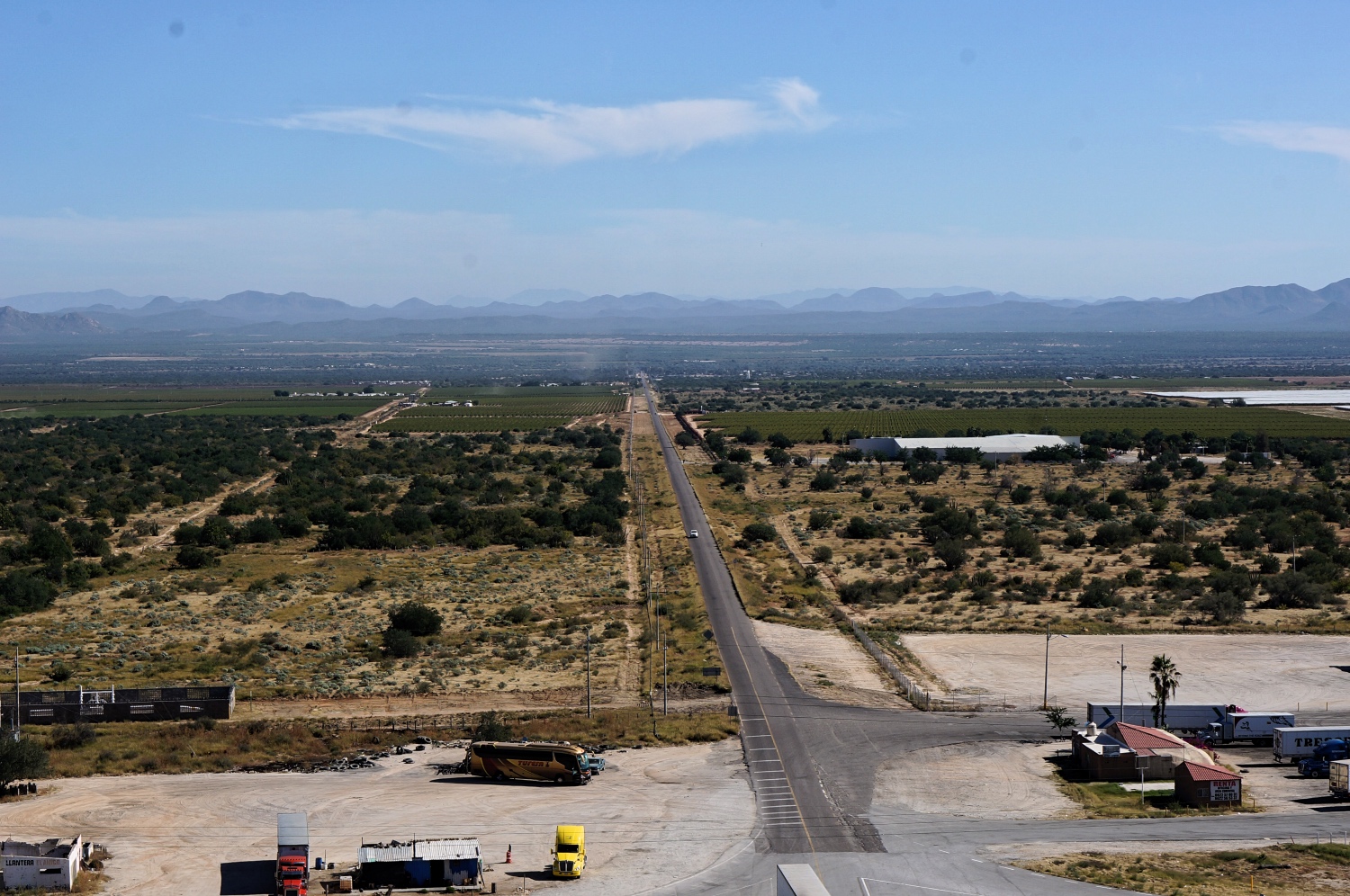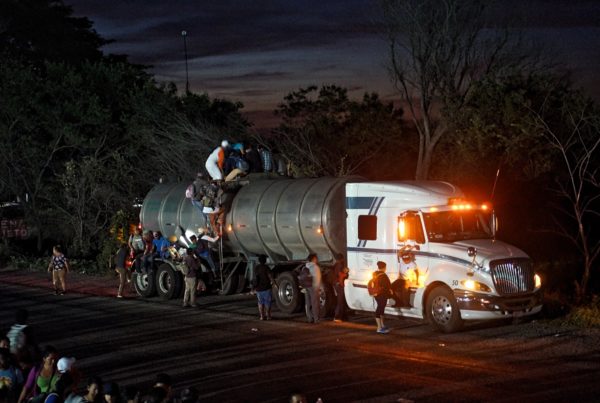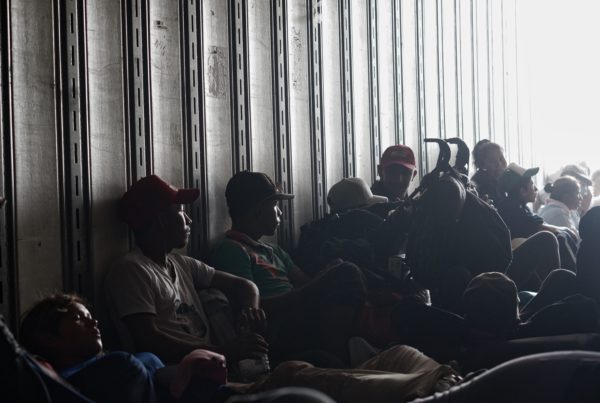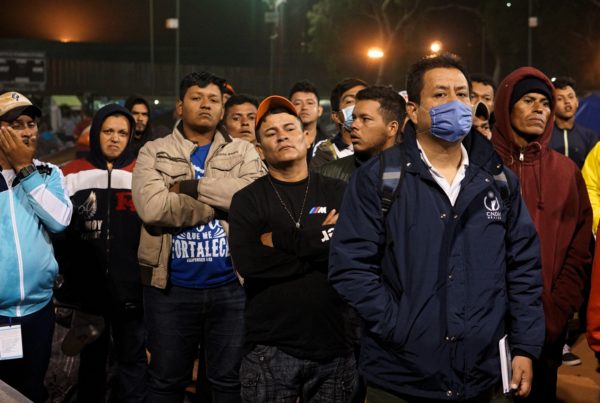After a very long, tiring journey the Exodus arrived in the city of Guadalajara at 10 o’clock at night. The city received the Exodus with a roofed space, food, and water. Later that evening, the Secretary of the Interior of Jalisco informed the Exodus that the state of Jalisco, one of the richest states in Mexico, did not have enough resources or food for them to stay the next day in Guadalajara. Despite the people’s fatigue, the Secretary of the Interior of Jalisco requested that the Exodus leave the city the next day.
The State of Jalisco agreed to arrange transportation for members of the Exodus from Guadalajara to the border of the states of Jalisco and Nayarit and suggested that the state of Nayarit would provide transportation to the state of Sinaloa. Keep in mind, Nayarit was in a critical condition after a recent hurricane. In a telephone call during the meeting, the governor’s office in Sinaloa claimed the people would be transferred as quickly as possible to Sinaloa. Thus began the dislocation of the Exodus across north-west Mexico.
The next morning, the line for buses started at 4 in the morning. Those women, children, and men who took the early buses were left 90 kilometres from the pick-up point in Nayarit, in the dark of dawn, on a desolate and unknown point of the road, in an area where drug cartels are known to operate, without transport or services.
David, Jenni and Christian started to line up for buses at 8 o’clock in the morning by which time half of the people had already left. It soon became clear that there weren’t enough buses to transport everyone. The caravan split into smaller groups trying to get to the meeting point at the Jalisco-Nayarit border, knowing that at night this stretch of road was especially insecure. The actions of the Jalisco government had sent a clear message to future caravans. They would not be welcome in Guadalajara.
David, Jenni and Christian caught a bus which left them on the outskirts of Guadalajara. They began walking and managed to hitch a ride with a generous man from Tequila who bought them chicken for breakfast and bought medication for Jenni who was very sick with a cough. They eventually managed to hitch rides to the meeting point at the border of Jalisco and Nayarit states where they waited with the rest of the Exodus for buses to Sinaloa.
From there people were loaded on and off buses at seemingly random locations on unknown highways for days on end until they reached Mexicali and the US border. Many members of the Exodus who were not part of the planning committees had little to no knowledge of how transport was being arranged. They just waited and hoped buses would arrive to pick them up and take them to the next location.
Jenni, Christian and David were left on a highway in Sinaloa at 10:30pm. The next morning at dawn they waited in line for several hours for another bus to take them to the state of Sonora. If they lost their place in the line, they lost their opportunity to catch a bus. Many people stayed on the side of the highway because there weren’t enough buses available. Jenni, Christian and David were lucky enough to get a ride. They didn’t arrive in Sonora until late the next evening.
The next day the people of the caravan who were in Sonora were restless and impatient to leave the highway and arrive in Mexicali. A few buses left in the morning; hundreds of people were left waiting. There were only a few stores to buy food and drink but they were expensive and David, Jenni and Christian couldn’t afford to eat or drink. They managed to get on a bus in the late afternoon but the trip was uncomfortable and long. They were tired, sleepy, hungry and thirsty. In the early hours of the morning it was very cold. Jenni didn’t even have a jumper. At about 5 in the morning they passed an accident. A truck had crashed and there was a lot of heavy traffic. They arrived in Mexicali more than 20 hours after they first boarded the bus having not eaten food and drank water for days. But their journey was better than most.
At 11pm on Thursday 15 November, two buses of men, women and children were stopped on the Hermosillo-Nogales highway in Sonora by personnel from the National Institute of Migration and Federal Police. The people on the first bus, including women and children, were taken to immigration detention. Those on the second bus refused to leave the bus so immigration personnel and federal police escorted the bus to Hermosillo where the bus passengers were told they would start their deportation process.
In the following days, the National Human Rights Commission arranged for the detained people to be released from detention and to be transferred to two migrant shelters. It was a frightening and stressful experience but ultimately they were given their freedom.
Antonio, Pedro and Tina travelled from San Luis Potosi where they had been staying to join the caravan in Guadalajara. On their way north they were stranded on the freezing cold highway near Navajoa in Sonora, unable to hitch rides across the vast and empty desert state. They spent 2 nights, vulnerable to the elements and operatives from drug cartels, waiting for buses which would transport them to Mexicali and the US border. The day was at its coldest in the early hours of the morning, just before the sun rose, when the mist lay across the desert valley. A hot sun rose over cactus and shrubs, the only vegetation on a dry landscape. If it had been March and the rainy season, this would have been fertile land. A long straight highway pointing north soaked up the heat. Blue sky touched the red horizon. Eventually buses arrived and transported them all the way to Mexicali.
The Exodus arrived in Baja California North in dribs and drabs. Strung-out, exhausted and knowing that the hardest part of their journey was yet to come.



